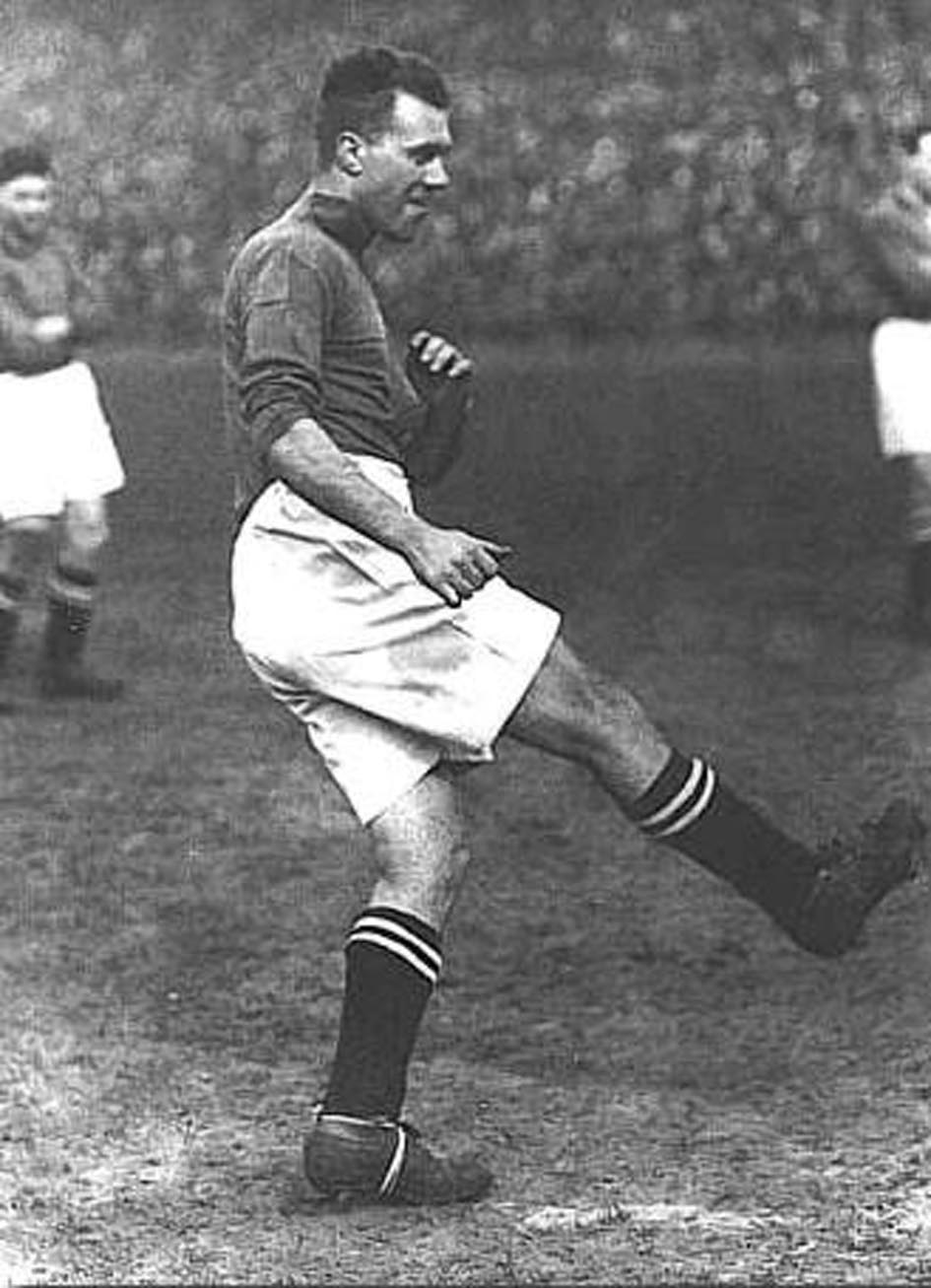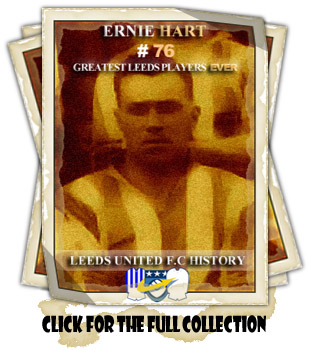

Hart: Ernest Arthur (Ernie)
1920-1936
(Player Details)
Centre Half
Born: Overseal, Nr Burton-upon-Trent: 03-01-1902
Debut: v Boothtown (h): 11-09-1920
5í11Ē 13st (1933)
#76 in 100 Greatest LUFC Players Ever

Ernie Hart went to Overseal School, played for Overseal Juniors and was signed by Leeds
from Doncaster minor club, Woodlands Wesleyans, in 1920, when United were formed. His
storming displays in the Reserve team soon saw him promoted to the first team, making his
debut, initially, when only eighteen years of age, as a virtual Leeds United Reserves team
took on Boothtown in an F.A. Cup qualifying tie. A further Cup appearance ensued two weeks
later, as Hart scored his first goal for United in a 7-0 romp against Leeds Steelworks. He
had just turned nineteen when he played his first game in the Football League and went on to
play five games in the 1920-21 season. The burly ex-Miner proved to be a tower of strength
in the Unitedís defence. Over the next sixteen seasons he was a first team regular at Elland
Road and was widely recognised as one of the best centre-halves in the game. His progress was
impeded after he had suffered injuries and only played five games in the 1926-27 season, as
United were relegated to the Second Division, in his absence. After having to concede his
first team spot to Scottish International Tom Townsley, he came back stronger than ever to
make thirty appearances the following season as United regained their place in the top flight
at the first attempt. A defender with a penchant for attack, he won a Second Division
Championship medal in 1923-24, captained Leeds, played for England eight times, represented
the Football League three times and toured South Africa with the FA in 1929. He also took part
in three England v Rest Trials, all for the England team. The first was on 4th February 1929
at Hillsborough, Sheffield, which was won 4-3, the second on 11th March 1929 at White Hart Lane,
Tottenham which was lost 1-2, and the third and final was at Roker Park, Sunderland on 21st
March 1934 when the Rest ran riot to win 7-1. He was known as a hard but fair performer.
However, he fell foul of a refereeís wrath only once, but it probably cost him further England
honours. He was sent off by Bradford referee J.E. Mellor in the 1933 West Riding Cup Final
against Huddersfield Town. Hart was banned for a month by the West Riding F.A. for swearing at
the referee, his only misdemeanour in all his years at Elland Road and, apart from losing £32
in wages, it also resulted in his being axed by the English F.A. from the England tour of Italy
and Switzerland. He had been selected to go on the tour with teammates Billy Furness and Wilf
Copping and would surely have picked up two more caps as he was England's incumbent
Centre-Half at the time. It was tough punishment which a player of Hartís calibre hardly
deserved. Hart earned his eight England caps between 1928 and 1934, including a memorable
appearance in the England team that beat Austria 4-3 in 1932. The early 1930ís Austrian team
were regarded as Continental Europe's strongest side, and had gone fourteen matches unbeaten
when they met England. His representative career spanned several years and mirrored his
fortunes and that of his club. He was first called up by the Football League on 7th November
1928 against the Scottish League at Villa Park when the home side won 2-1. He gained his
first cap for England in a 3-2 win over Wales at the Vetch Field Swansea on 17th November
1928 alongside Willis Edwards, who captained England. He was a member of the F.A. tour to
South Africa in the summer of 1929, playing in the three "Tests" against South Africa in a
3-2 win in Durban on 15th June, when he scored the first goal, on 13th July in a 2-1 win in
Johannesburg and on 17th July in a 3-2 win in Cape Town. Teammate Bobby Turnbull also played
in the last two Tests. He was back on representative duty on 25th September 1929 against the
Irish League in a 7-2 rout at Goodison Park before making his third and final Inter-League
appearance at Ibrox Park on 2nd November 1929 in a 1-2 defeat. He also played for the
Professionals in a 3-0 win over the Amateurs at Millwall on 7th October 1929. His second
England cap came on 19th October 1929 in Belfast in a 3-0 win over Northern Ireland, alongside
Willis Edwards who again captained England, with United's Harry Duggan at Outside-Right in the
ranks of the opposition. A month later he picked up his third cap, again in tandem with England
Captain Willis Edwards on 20th November 1929 in a 6-0 rout of Wales at Stamford Bridge. That
game was to be Edwards' final game for England after six successive appearances as captain and
Hart must also have been wondering about further caps as Leeds again lost the place in the top
flight in 1930-31, but powered by the Edwards-Hart-Copping triumvite they were again promoted
at the first attempt. His fourth England cap also was won at Stamford Bridge, but against much
stiffer opposition in the form of Europe's strongest side, the Austrian "Wunderteam", who were
beaten 4-3 on 7th December 1932. He maintained his England place and gained his fifth cap came
on 1st April 1933 against Scotland at Hampden Park. A record 134,170 crowd roared the home
side to a 2-1 victory and it seemed as if Hart had cemented his England place once more. But
then came the sending off which meant he was not available for the Continental tour which saw
a 1-1 draw with Italy on 13th May 1933 and a 4-0 win over Switzerland a week later. He was
back again for the next England battle with Scotland on 14th April 1934, which saw England
gain revenge with a 3-0 win at Wembley wich saw "Raich" Carter make his England debut and
Hart totally blotting out Scottish dangerman Hughie Gallacher. He duly made the ensuing
Continental Tour playing his final two International games in a 2-1 win over Hungary in
Budapest on 10th May 1934 and a 2-1 defeat by Czechoslovakia in Prague six days later, to
bring down the curtain on a fine International career. He left Leeds for Mansfield Town,
two years later, in August 1936, where he played twenty-eight games, and in July 1938 he
was appointed manager at Tunbridge Wells. He also scouted for Coventry City. On retirement,
Hart went into business as a haulage contractor and bus service operator. He bought a bus
and began a coach business based in Doncaster as E.A.Hart, which traded as the Beehive Bus
Company. The business prospered and later was purchased by Wilfreda Coaches soon after they
moved to the new headquarters at Adwick-le-Street, near Doncaster. The joint company still
trades as Wilfreda Beehive, a luxury coach company still operating from Doncaster and now
nationally known. He was a scout for Leeds United until his death, in Leeds General
Infirmary, after a long illness, on 21st July 1954, aged fifty-two.